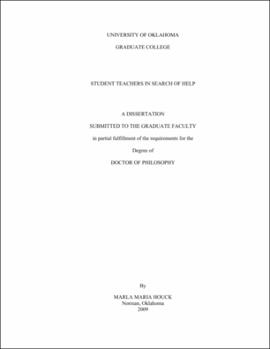| dc.contributor.advisor | Chiodo, John | |
| dc.creator | Houck, Marla Maria | |
| dc.date.accessioned | 2019-04-27T21:35:44Z | |
| dc.date.available | 2019-04-27T21:35:44Z | |
| dc.date.issued | 2009 | |
| dc.identifier | 99320972502042 | |
| dc.identifier.uri | https://hdl.handle.net/11244/319096 | |
| dc.description.abstract | Student Teachers in Search of Help | |
| dc.description.abstract | This study sought to answer the following question: from whom, how and how often did student teachers at a large southwestern university in the United States seek help regarding the various problems that arose during their internship? This two-phased, sequential mixed methods study initially used quantitative data obtained from a sample of 27 secondary student teachers enrolled in a teacher education program. The student teachers completed a self-assessing survey to find out what was their most critical problem, whom they contacted for help, how they made contact with their potential helper, and how often they sought help. Additional data were collected from personal interviews of eleven student teachers, five university supervisors, and eight cooperating teachers. | |
| dc.description.abstract | Student teachers in this study reported at least one critical problem for the week they completed the survey and all but one sought help from multiple helpers. Students, cooperating teachers, and university supervisors agreed that problems during internships were usually discussed via face to face encounters and general classroom management problems were the most common. Problems associated with preparation of lessons were mentioned the least. Cooperating teachers were the single most frequently reported helpers with an average of four requests for help per week from each student teacher. University supervisors and professors were contacted least often for help. | |
| dc.description.abstract | Interestingly when requests for help recorded on the surveys from family members and friends were totaled, they outnumbered the requests for help from the cooperating teachers by five percent. Peers comprised 13% of the requests for help, making the category of helpers outside the triad and university personnel responsible for 46% of the requests for help. Easy access to potential helpers such as family and friends via cell phones and the Internet may have encouraged students to communicate with others outside the traditional triad when problems arose during their internship. These sources could have provided a safe environment for somewhat insecure student teachers to receive advice and encouragement. | |
| dc.description.abstract | The results of this study and other studies (Hsu, 2005: McNally et al., 1997) have shown that student teachers seek others for help with sundry problems during their internship. The triad alone did not suffice for support of student teachers. This study suggests that collaboration and discourse with knowledgeable others during internships should be encouraged whenever possible, and better use of the knowledge within the triad could be profitable to the university, future teachers, and the P-12 students of the United States. | |
| dc.format.extent | 132 pages | |
| dc.format.medium | application.pdf | |
| dc.language | en_US | |
| dc.relation.requires | Adobe Acrobat Reader | |
| dc.subject | Student teachers--Psychology | |
| dc.subject | Help-seeking behavior | |
| dc.title | Student Teachers in Search of Help | |
| dc.type | text | |
| dc.type | document | |
| dc.thesis.degree | Ph.D. | |
| ou.group | Jeannine Rainbolt College of Education::Department of Instructional Leadership and Academic Curriculum | |
